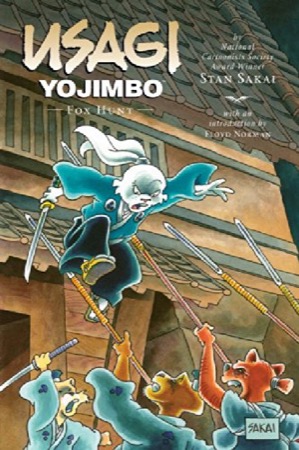Usagi Yojimbo: Fox Hunt

I’ve enjoyed the recent issues of the Usagi Yojimbo series I’ve sampled, so I was eager to try the latest collection. Fox Hunt is the nearly unbelievable 25th in the series, although it’s smartly not numbered as such — that way, it doesn’t turn off new readers like me, and it stands alone just fine.
The volume reprints issues #110-116 of the comic series by Stan Sakai along with the Usagi piece from MySpace Dark Horse Presents #18. The stories cover a gamut of genres, held together by Usagi and his traveling buddy Gen, a blustery, greedy mercenary who makes Usagi look all the better and more noble.
The book’s first chapter, “Kitsune Gari”, means “Fox Hunt” and gives the book its title. Following a mysterious shortcut through the forest, fox spirits (who can impersonate others) attempt to teach Gen a lesson about being arrogant and stingy by tricking him into fighting someone who looks like Usagi.
We also meet Sakura, a former noblewoman who’s now a traveling gambler, searching for a long-lost family member. When she takes pity on a slave girl, Usagi and Gen must help her against a vengeful local boss. To lighten the mood after, there’s a piece about competing for a bounty hunter job and a double-crossing snitch. Usagi also rescues a spy from ninja and gets involved in a dispute between two lords fighting over possession of a castle.
I don’t have the language to describe Stan Sakai’s skilled storytelling. His figures are beautifully expressive at the same time they’re wonderfully cartoony. I’m a particular fan of his settings, the forest trails they travel from town to village inn, the way he draws wood and vegetation. His characters use caricature to make their point — the snitch, for example, looks weaselly from the get-go, with beady eyes and cringing posture.
These stories are simple in structure, with a strong sense of justice, in keeping with the samurai code. I find them pleasantly escapist, both in terms of the historical/cultural setting and the message that a mysterious stranger can come into town and set things right. It’s almost a Western in that way.
“Saya” (“Scabbards”) is the high point of the book for me, as it starts with an object lesson about the difference between true ethics compared to an exaggerated faithfulness to the rules of etiquette regardless of context. Playful kids accidentally knock Usagi Yojimbo into another noble, and he takes Usagi’s “lack of courtesy” to ridiculous extremes, demanding satisfaction. Usagi apologizes gracefully, but finally concludes (in my favorite panel), “It is clear that no apology I offer will satisfy you.” Some people just enjoy being offended. (This is the short tale that ran on MySpace.)
Find out more at the series website. (The publisher provided a review copy.)

One comment